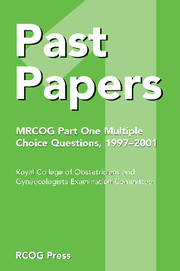Book contents
- Frontmatter
- Contents
- Introduction
- March 1997 – Paper 1
- March 1997 – Paper 2
- September 1997 – Paper 1
- September 1997 – Paper 2
- March 1998 – Paper 1
- March 1998 – Paper 2
- September 1998 – Paper 1
- September 1998 – Paper 2
- March 1999 – Paper 1
- March 1999 – Paper 2
- September 1999 – Paper 1
- September 1999 – Paper 2
- March 2000 – Paper 1
- March 2000 – Paper 2
- September 2000 – Paper 1
- September 2000 – Paper 2
- March 2001 – Paper 1
- March 2001 – Paper 2
- September 2001 – Paper 1
- September 2001 – Paper 2
- Index
March 2000 – Paper 2
Published online by Cambridge University Press: 05 July 2014
- Frontmatter
- Contents
- Introduction
- March 1997 – Paper 1
- March 1997 – Paper 2
- September 1997 – Paper 1
- September 1997 – Paper 2
- March 1998 – Paper 1
- March 1998 – Paper 2
- September 1998 – Paper 1
- September 1998 – Paper 2
- March 1999 – Paper 1
- March 1999 – Paper 2
- September 1999 – Paper 1
- September 1999 – Paper 2
- March 2000 – Paper 1
- March 2000 – Paper 2
- September 2000 – Paper 1
- September 2000 – Paper 2
- March 2001 – Paper 1
- March 2001 – Paper 2
- September 2001 – Paper 1
- September 2001 – Paper 2
- Index
Summary
1. Concerning pH:
A. In blood, pH is regulated predominantly by bicarbonate.
B. The higher the pH, the higher the hydrogen ion concentration.
C. The pH of gastric juice is 5.5.
D. The pH of urine decreases after the ingestion of ammonium chloride.
E. The pH inside cells is higher than that in plasma.
2. In the adrenal cortex
A. ACTH controls the hydroxylation of cholesterol to pregnenolone.
B. oestradiol can be formed from testosterone.
C. androstenedione and testosterone are interconvertible.
D. 17α-hydroxyprogesterone is a breakthrough product of corticosterone.
E. aldosterone is formed from corticosterone.
3. The conversion of glucose to lactic acid
A. occurs in a single enzymatic reaction.
B. is the only pathway for the synthesis of ATP in the red blood cell.
C. is a reversible process in skeletal muscle.
D. is inhibited by high cellular concentrations of ATP.
E. occurs in skeletal muscle when the availability of oxygen is limited.
4. Glucagon
A. is a polypeptide hormone.
B. is secreted by the beta cells of the pancreatic islets.
C. causes muscle glycogenolysis.
D. has a half-life of 5–10 minutes in the circulation.
E. secretion is stimulated by cortisol.
5. Concerning prostaglandins (PG)
A. Arachidonic acid is the precursor for PG biosynthesis.
B. PG synthetase (cyclooxygenase) catalyses arachidonic acid conversion to PG endoperoxides.
C. Nonsteroidal anti-inflammatory drugs inhibit PG dehydrogenase.
D. Mefenamic acid is a more potent inhibitor of PG synthesis than aspirin.
E. PGF2α is excreted unchanged in urine.
Information
- Type
- Chapter
- Information
- Past Papers MRCOG Part One Multiple Choice Questions1997–2001, pp. 131 - 140Publisher: Cambridge University PressPrint publication year: 2004
